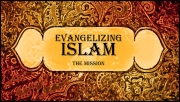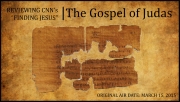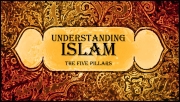
For the first time I have to level some criticism at the series “Finding Jesus” airing Sunday nights on CNN. Episode four, “The Secret Brother of Jesus” is a confusing mash of history and conjecturer rolled into a single presentation of the life of James that doesn’t leave room for other, possibly more accurate, understandings of the man’s life. And far too much importance is given to Catholic tradition and pseudepigraphal works. For instance, the program references the three texts below as if they were credible resources, which they clearly are not.
Read more: CNN's "Finding Jesus" Episode 4

Continuing to examine CNN’s attempt to report on early Christianity through their series Finding Jesus, we find ourselves looking at episode two, John the Baptist. I’d like to say oat the start that I certainly mean no disrespect to the prophet by using only a head shot for the articles title slide. While I’m sure John did not know how or when he would die, I believe he suspected it would be pretty horrible. After all, God’s prophet’s rarely dies of natural causes. But I digress, let us discuss CNN’s special.
Read more: CNNs Finding Jesus, Episode 2
 This has been a long topical series, perhaps the longest in our short history here at Think-Biblically. Hopefully it has been informative and helped every reader learn a little something about both their role in this world, their duty before God, and an appropriate response to conflict. In concluding our study of Islam I’d like to review what we learned.
This has been a long topical series, perhaps the longest in our short history here at Think-Biblically. Hopefully it has been informative and helped every reader learn a little something about both their role in this world, their duty before God, and an appropriate response to conflict. In concluding our study of Islam I’d like to review what we learned.
Read more: Islam - Conclusion
 It is difficult to estimate the number of “radicalized” Muslim’s around the world, and depending on the source it can be as few as six percent to as many as 54 percent. The number most news services fall on is between 15 to 25 percent, and I can’t help but wonder what the world would look like of the same percentage of Christians were vocal about their faith in Jesus.
It is difficult to estimate the number of “radicalized” Muslim’s around the world, and depending on the source it can be as few as six percent to as many as 54 percent. The number most news services fall on is between 15 to 25 percent, and I can’t help but wonder what the world would look like of the same percentage of Christians were vocal about their faith in Jesus.
Read more: The Mission

Once again I have nothing but praise for the work of the CNN crew on their series “Finding Jesus”. In the third episode they discuss the person of Judas and 20th century find of the Gospel of Judas. They begin according to their pattern of dramatically telling the story from the Biblical accounts starting with his call to follow Jesus and ending with his suicide before plunging into the origins and story of the ancient text bearing his name. Amazingly, they do justice to both in just 42 minutes.
Read more: Gospel of Judas

As most of you know 30 days ago I took the Nazarite Vow and dedicated the time in special service to God. There were a number of restrictions, especially dietary ones, which caused some of my friends to ask, “Why are you doing this?” A good question that deserves a good answer. Here is that answer. I found that by living differently I had to live more thoughtfully. Thinking about my food choices forced me to consider how I could eat and still honor God. I also learned that most foods are better with cheese.
Read more: Nazarite Vow Concludes
 We ended yesterday’s blog with a question: What is a peace-loving society to do when presented with Islamic hatred? We have moved from the personal response, which is to love people as creations of God regardless of their personal beliefs and try to convince them of the truth of the gospel, to a national response of one state verses another which does not adhere to the same set of rules and instruction from the Bible.
We ended yesterday’s blog with a question: What is a peace-loving society to do when presented with Islamic hatred? We have moved from the personal response, which is to love people as creations of God regardless of their personal beliefs and try to convince them of the truth of the gospel, to a national response of one state verses another which does not adhere to the same set of rules and instruction from the Bible.
Read more: What of Iran?
 We’ve examined the Quran and the story of its origins, and the origin story of Islam itself through the experiences of Muhammad, but there is more to a Muslim life. While the Quran is Allah’s word and meant to be studied and meditated upon, Hadith is Muhammad’s word and governs the rest of a follower’s civil and personal duty. A part of the Hadith is what is commonly known as Sharia Law. Today we’ll begin to examine what this law is, as it is just as much a part of Islam as the Quran.
We’ve examined the Quran and the story of its origins, and the origin story of Islam itself through the experiences of Muhammad, but there is more to a Muslim life. While the Quran is Allah’s word and meant to be studied and meditated upon, Hadith is Muhammad’s word and governs the rest of a follower’s civil and personal duty. A part of the Hadith is what is commonly known as Sharia Law. Today we’ll begin to examine what this law is, as it is just as much a part of Islam as the Quran.
Read more: Evangelizing Islam

There’s a news story going around this week about a lie told in the social media of the late 1800’s, that is newspapers and magazines. Most of these publications are no longer in existence and were published overseas so it’s difficult to trace and even know if the reporting is accurate, but according to the story the media hyped something called “bicycle face” to keep women from riding bikes. It’s hard to believe, but supposedly men didn’t like the new-found freedom women discovered from biking around town, so they invented a medical condition that amounts to what mothers tell preschoolers – “You keep making that face and its going to get stuck that way.”
Read more: Bicycle Face

A couple weeks ago CNN started a series of “investigative” pieces about our Lord called “Finding Jesus”. When I first saw it advertised I wondered if it might be good material to address here at Think-Biblically.com, until I saw the first episode was on the shroud of Turin. I’ve never been too enamored with the shroud throughout my Christian life because it isn’t mentioned in the Bible, and if it isn’t mentioned there how important can it be, really? What it lacks in biblical importance, however, it makes up for in cultural significance. Like it or not, people talk about the shroud and everyone has a point of view.
Read more: CNN's "Finding Jesus" Episode 1
 So far we have learned that Islam is more than a personal religion of war and hatred as taught in the Quran, it also has a social side that governs society called the Hadith. It is therefore a marriage of religion and politics, creating a totalitarian state lead by Jihadists and obeyed by the masses. This means that Islam is not only a religion to be overcome by Jesus, but a form of government that can be responded to by other governments around the globe.
So far we have learned that Islam is more than a personal religion of war and hatred as taught in the Quran, it also has a social side that governs society called the Hadith. It is therefore a marriage of religion and politics, creating a totalitarian state lead by Jihadists and obeyed by the masses. This means that Islam is not only a religion to be overcome by Jesus, but a form of government that can be responded to by other governments around the globe.
Read more: Lessons from Al-Hudaybiyah
 Over the past couple weeks we’ve looked at the basics of Islam and started looking at what it takes to evangelize a Muslim. Now it’s time to turn to more specific information regarding Islam to prepare the believer to speak intelligently about both faiths. Today we’ll examine the Five Pillars of Islam, rules accepted by all factions of Islam.
Over the past couple weeks we’ve looked at the basics of Islam and started looking at what it takes to evangelize a Muslim. Now it’s time to turn to more specific information regarding Islam to prepare the believer to speak intelligently about both faiths. Today we’ll examine the Five Pillars of Islam, rules accepted by all factions of Islam.
Read more: The Five Pillars


 This has been a long topical series, perhaps the longest in our short history here at Think-Biblically. Hopefully it has been informative and helped every reader learn a little something about both their role in this world, their duty before God, and an appropriate response to conflict. In concluding our study of Islam I’d like to review what we learned.
This has been a long topical series, perhaps the longest in our short history here at Think-Biblically. Hopefully it has been informative and helped every reader learn a little something about both their role in this world, their duty before God, and an appropriate response to conflict. In concluding our study of Islam I’d like to review what we learned. It is difficult to estimate the number of “radicalized” Muslim’s around the world, and depending on the source it can be as few as six percent to as many as 54 percent. The number most news services fall on is between 15 to 25 percent, and I can’t help but wonder what the world would look like of the same percentage of Christians were vocal about their faith in Jesus.
It is difficult to estimate the number of “radicalized” Muslim’s around the world, and depending on the source it can be as few as six percent to as many as 54 percent. The number most news services fall on is between 15 to 25 percent, and I can’t help but wonder what the world would look like of the same percentage of Christians were vocal about their faith in Jesus.

 We ended yesterday’s blog with a question: What is a peace-loving society to do when presented with Islamic hatred? We have moved from the personal response, which is to love people as creations of God regardless of their personal beliefs and try to convince them of the truth of the gospel, to a national response of one state verses another which does not adhere to the same set of rules and instruction from the Bible.
We ended yesterday’s blog with a question: What is a peace-loving society to do when presented with Islamic hatred? We have moved from the personal response, which is to love people as creations of God regardless of their personal beliefs and try to convince them of the truth of the gospel, to a national response of one state verses another which does not adhere to the same set of rules and instruction from the Bible. We’ve examined the Quran and the story of its origins, and the origin story of Islam itself through the experiences of Muhammad, but there is more to a Muslim life. While the Quran is Allah’s word and meant to be studied and meditated upon, Hadith is Muhammad’s word and governs the rest of a follower’s civil and personal duty. A part of the Hadith is what is commonly known as Sharia Law. Today we’ll begin to examine what this law is, as it is just as much a part of Islam as the Quran.
We’ve examined the Quran and the story of its origins, and the origin story of Islam itself through the experiences of Muhammad, but there is more to a Muslim life. While the Quran is Allah’s word and meant to be studied and meditated upon, Hadith is Muhammad’s word and governs the rest of a follower’s civil and personal duty. A part of the Hadith is what is commonly known as Sharia Law. Today we’ll begin to examine what this law is, as it is just as much a part of Islam as the Quran.

 So far we have learned that Islam is more than a personal religion of war and hatred as taught in the Quran, it also has a social side that governs society called the Hadith. It is therefore a marriage of religion and politics, creating a totalitarian state lead by Jihadists and obeyed by the masses. This means that Islam is not only a religion to be overcome by Jesus, but a form of government that can be responded to by other governments around the globe.
So far we have learned that Islam is more than a personal religion of war and hatred as taught in the Quran, it also has a social side that governs society called the Hadith. It is therefore a marriage of religion and politics, creating a totalitarian state lead by Jihadists and obeyed by the masses. This means that Islam is not only a religion to be overcome by Jesus, but a form of government that can be responded to by other governments around the globe. Over the past couple weeks we’ve looked at the basics of Islam and started looking at what it takes to evangelize a Muslim. Now it’s time to turn to more specific information regarding Islam to prepare the believer to speak intelligently about both faiths. Today we’ll examine the Five Pillars of Islam, rules accepted by all factions of Islam.
Over the past couple weeks we’ve looked at the basics of Islam and started looking at what it takes to evangelize a Muslim. Now it’s time to turn to more specific information regarding Islam to prepare the believer to speak intelligently about both faiths. Today we’ll examine the Five Pillars of Islam, rules accepted by all factions of Islam.